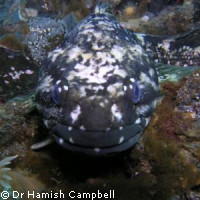Antarctic fish take to bed for winter
Scientists from the British Antarctic Survey (BAS) have revealed, for the first time, that Antarctic fish species go into hibernation in winter. The study, published in the journal PLoS ONE, found that the Antarctic cod Notothenia coriiceps can minimise the energy it uses and enter a dormant state so as to survive long, harsh winters. Hibernation is a state of inactivity and metabolic depression in animals, characterised by lower body temperature, slower breathing, and lower metabolic rate. Hibernation conserves energy, especially during winter when food is short. Many species of mammals, birds, reptiles and amphibians go into hibernation for a period of several days or weeks. Up until now, however, no fish have been found to adopt this winter survival strategy. It was believed that this was due to the fact that a reduction in metabolic rate in fish is directly proportional to a decrease in water temperature. Fish appeared to be incapable of further suppressing their metabolic rate independently of temperature For the purposes of the study, the BAS researchers examined the behavioural and metabolic strategy of the Antarctic fish Notothenia coriiceps, a widespread omnivorous predator of the Antarctic and sub Antarctic inshore waters. Swimming activity, heart rate and metabolism were recorded by miniaturised electronic devices over a full annual cycle, as the fish responded to the annual physical and biotic fluxes of the Southern Ocean. Scientists already knew that fish in the Antarctica have much lower metabolic rates than fish elsewhere, as well as blood that contain 'anti-freeze' proteins. This allows them to live in the near-freezing waters. However, this new research found that the N. coriiceps' metabolic rate was not temperate-driven. The fish are thus able to further depress these metabolic processes during the winter months. From this extensive dataset, together with seasonal measurements of growth and feeding from wild fish, the researchers were able to show that N. coriiceps employ a hibernation-like ecological strategy. Throughout the summer months the fish spend a considerable proportion of their time foraging, resulting in considerable growth rate. In contrast, during winter much of the time is spent sedentary within a refuge and fish show a net loss in growth. During these periods of inactivity in winter, the N. coriiceps studied displayed a very low heart rate, reduced sensory and motor capabilities, and a standard metabolic rate that was one-third lower than in summer. 'Hibernation is a pretty complex subject. Fish are generally incapable of suppressing their metabolic rate independently of temperature. Therefore, winter dormancy in fish is typically directly proportional to decreasing water temperatures,' explains lead author Dr Hamish Campbell, formerly at the University of Birmingham, UK, but now at University of Queensland, Australia. 'The interesting thing about these Antarctic cod is that their metabolic rates are reduced in winter even though the seawater temperature doesn't decrease much. It seems unlikely that the small winter reductions in water temperature that do occur are causing the measured decrease in metabolism. However, there are big seasonal changes in light levels, with 24 hour light during summer followed by months of winter darkness - so the decrease in light during winter may be driving the reduction in metabolic rates,' he continues. The scientists conclude that the ability of N. coriiceps to actively suppress physiological processes beyond what is generally viewed as the extreme lower thermal threshold suggests that the 'over-wintering' Antarctic fish may be harbouring further cellular secrets.
Countries
United Kingdom



